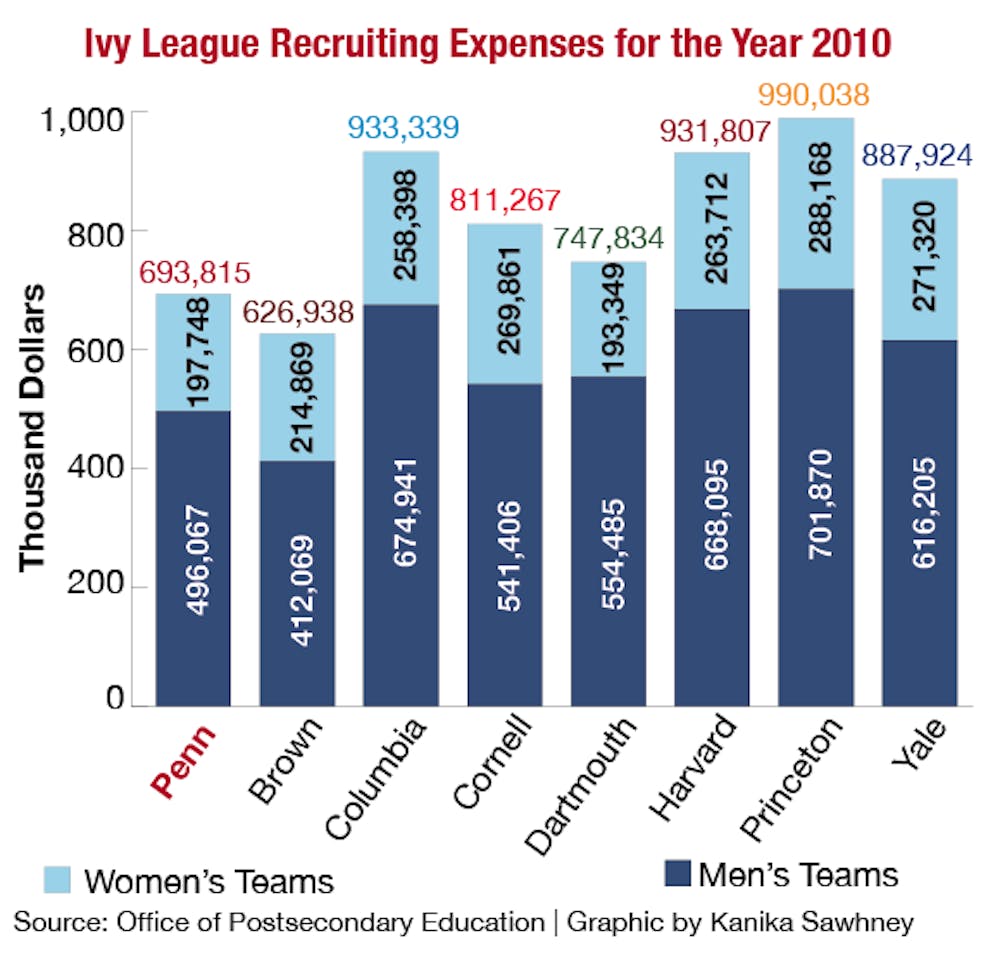While the Penn men’s basketball team scours the country — and even beyond — for recruits, they may be spending less money than many may think.
The Penn athletic department spent the second-least amount on total recruiting expenses in the Ivy League last academic year, according to the Office of Postsecondary Education Equity in Athletics Disclosure database.
Penn allocated just over $690,000 to help lure athletes to University City. The only Ancient Eight school that spent less was Brown.
“We really ask our coaches to build their budget from the bottom up,” Penn Senior Associate Director of Athletics, Alanna Shanahan said. “We want them to tell us what they need recruiting-wise to be successful … We know it probably dictates 80 percent of success.”
Since travel comprises most of the money spent on recruiting, the amount can vary for each sport. Sports that have successful high-school programs in the Northeast and Mid-Atlantic regions, like lacrosse, require fewer funds.
“You really do almost break it down by a sport-by-sport analysis,” Shanahan said.
She also noted that some recruiting cycles start earlier than others.
“[For] sports like soccer and lacrosse, it seems like a lot of recruitment and interest happens at the end of their junior year of high school,” she said. “You’re actually not allowed to pay for a student to come visit your school until their senior year.”
“What’s happening is that a lot of students are looking to commit early to a program,” Yale Athletics Director Thomas Beckett said. “A lot of students will come for unofficial visits [which are not paid for by the school] … so the costs associated with [those] particular students are nominal.”
Yale, which ranks fourth in the Ivies, spent about $888,000 on recruiting last year.
“The Ivy League does spend a lot of money on recruiting because they’re looking for those very bright and gifted people and you have to go and find them wherever they may be,” Beckett said.
For reference, the Ivy League as a whole spends about twice the amount on recruiting as its academic peer, the Patriot League, which does offer scholarships to its athletes.
Ranking atop the Ancient Eight is Princeton, which had $990,000 in recruiting expenses last year.
Princeton’s recruiting expenses surpass major programs such as Miami, and are closer in number to national powerhouses Ohio State and Florida than they are to Penn.
“It’s always nice to keep your eye on the competition but it’s not what drives us,” Shanahan said. “We really thrive ourselves and think strategically about what type of recruiting budget we need to be successful.”
Beckett agreed that Yale’s budget is largely independent of other Ivies.
“We don’t build our budget based on what anyone else is doing in the league, we do it based on our need and our abilities to provide the support and resources for that effort,” he said.
The report also reveals Ivy League schools allocate a greater proportion of their recruiting budgets toward male sports.
At Yale, where there are 106 — or 25 percent — more male athletes than female athletes, a gap of almost $345,000 exists between male and female recruiting expenses.
“They stay in the same hotel, they travel by airplane if it’s a certain distance from the campus … those policies are consistent for all the recruiting efforts,” Beckett said. “Trying to recruit large numbers of people is much different than trying to fill one or two spots on a tennis team or a golf team.”
At Penn, where there are 222 — 63 percent — more male athletes than female athletes, the margin is just under $300,000.
“There is a difference on what we’re doing on the men’s and women’s side,” Shanahan said. “We have two football programs which will drive up recruiting numbers just by the definition.”
Yale does not have a sprint football team.
Despite Penn’s smaller budget, the Quakers still attract top talent. The arrivals of gymnastics’ two-time Eastern Collegiate Athletic Conference Rookie of the Week, Amber Woo, and men’s soccer’s Ivy League Rookie of the Year, Duke Lacroix, are evidence that the school with the heaviest wallet may not always win the prize.
But compare Princeton’s Ivy titles this year to Penn’s, and the Tigers have four to the Quakers’ one. The numbers don’t lie.



